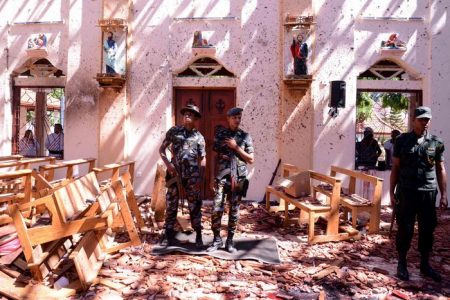
What we know about the Easter terrorist attacks in Sri Lanka?
At least 290 people have been killed and more than 450 injured in Sri Lanka after suicide bombers from a religious extremist group struck churches and hotels in multiple cities on Sunday morning. Three Catholic churches were targeted while their Easter services were under way, and three five-star hotels were attacked in and around the country’s capital, Colombo.
It is the worst violence the country since the end of a brutal 26-year civil war a decade ago, and the largest targeted attack on Christians in South Asia in memory — let alone on one of the faith’s holiest days. Below is a running account of what we know so far.
It’s not yet clear precisely how the attacks were carried out, but images from inside the bombed churches — which show smashed pews and scarred walls and ceilings — seem to indicate that the bombers were able to enter the cathedrals before detonating. A man who arrived at St. Anthony’s Shrine immediately after the attack told the New York Times that he saw “a river of blood” inside the church, and that “Ash was falling like snow.”
Restaurants appear to have been the targets in at least two of the hotels. At the Shangri-La Hotel, the bomber reportedly targeted a third-floor restaurant where brunch was underway, according to a witness. A ground-floor restaurant was attacked at the Cinnamon Grand Hotel.
A top police official alerted security officials in an advisory 10 days ago about a threat to prominent churches from a radical Islamist group, National Thowheeth Jama’ath. But it was unclear what safeguards, if any, were taken, or if in the end the group played any role in Sunday’s violence. And on Sunday, reflecting frictions within the government, the prime minister pointedly said he had not been informed.
The social media blackout is becoming a common occurrence in the region in the aftermath of violence. In March last year, the Sri Lankan government banned Facebook and other social media sites after reports of an attack on a Buddhist temple in Abathanna triggered deadly anti-Muslim riots across Kandy, in which hundreds of homes and businesses were destroyed by hardline Buddhist groups. In neighbouring India, WhatsApp has been blamed for fuelling a spate of murders and violence linked to rumours spread on the messaging app relating to alleged child kidnappers.
Source: The Cut








You must be logged in to post a comment.